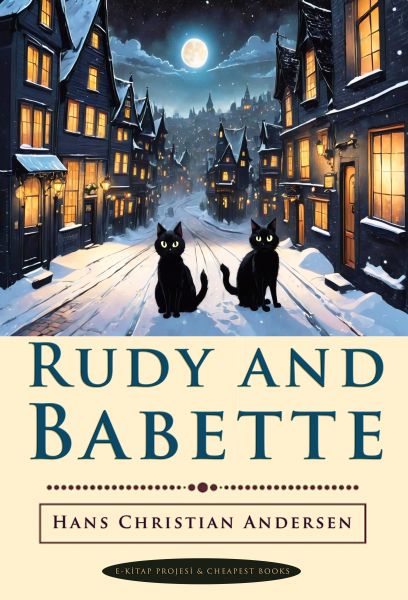Rudy and Babette
LET us now go to Switzerland, and see its wonderful mountains, whose steep, rocky sides are covered with trees. We will climb up to the fields of snow, and then make our way down to the grassy valleys, with their countless streams and rivulets, impetuously rushing to lose themselves in the sea. The sunshine is hot in the narrow valley; the snow becomes firm and solid, and in the course of time it either descends as an avalanche, or creeps along as a glacier.
THERE are two of these glaciers in the valleys below the Schreckhorn and the Wetterhorn, near the long village of Grindelwald. They are a remarka-ble sight, and therefore many travelers from all countries come in the summer to visit them: they come over the high mountains covered with snow, they traverse the deep valleys; and to do this they must climb, hour after hour, leaving the valley far beneath them, till they see it as if they were in an air-balloon.
The clouds hang above them like thick mists over the mountains, and the sun's rays make their way through the openings between the clouds to where the brown houses lie spread, lighting up some chance spot with a vivid green. Below, the stream foams and blusters; but above it murmurs and ripples, and looks like a band of silver hanging down the side of the rock.
On either side of the path up the mountain lie wooden houses. Each house has its little plot of potatoes; and this they all require, for there are many children, and they all have good appetites. The children come out to meet every stranger, whether walking or riding, and ask him to buy their carved wooden châlets, made like the houses they live in. Be it fine or be it wet, the children try to sell their carvings.
About twenty years since you might have seen one little boy standing apart from the others, but evidently very desirous to dispose of his wares. He looked grave and sad, and held his little tray tightly with both hands as if he was afraid of losing it. This serious look and his small size caused him to be much noticed by travelers, who often called him and purchased many of his toys, though he did not know why he was so favored. His grandfather lived two miles off among the mountains, where he did his carving. He had a cabinet full of the things he had made.
There were nut-crackers, knives and forks, boxes carved with leaves and chamois, and many toys for children; but little Rudy cared for nothing so much as for an old gun, hanging from a rafter in the ceiling, for his grandfather had told him it should be his own when he was big enough to know how to use it..
Hans Christian Andersen (1805 – 1875) was a Danish author. Although a prolific writer of plays, travelogues, novels, and poems, he is best remembered for his literary fairy tales.
Andersen's fairy tales, consisting of 156 stories across nine volumes, have been translated into more than 125 languages. They have become embedded in Western collective consciousness, accessible to children as well as presenting lessons of virtue and resilience in the face of adversity for mature readers. His most famous fairy tales include "The Emperor's New Clothes", "The Little Mermaid", "The Nightingale", "The Steadfast Tin Soldier", "The Red Shoes", "The Princess and the Pea", "The Snow Queen", "The Ugly Duckling", "The Little Match Girl", and "Thumbelina". His stories have inspired ballets, plays, and animated and live-action films.
Versandkostenfreie Lieferung! (eBook-Download)
Als Sofort-Download verfügbar
- Artikel-Nr.: SW9786052259818110164
- Artikelnummer SW9786052259818110164
-
Autor
Hans Christian Andersen, Hans Christian Andersen
- Wasserzeichen ja
- Verlag E-Kitap Projesi & Cheapest Books
- Seitenzahl 200
- Veröffentlichung 10.02.2024
- ISBN 9786052259818

